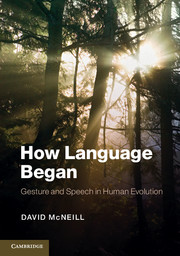Book contents
- Frontmatter
- Contents
- List of figures
- List of tables
- Preface – Out on a limb
- Acknowledgments
- 1 INTRODUCTION – GESTURE AND THE ORIGIN OF LANGUAGE
- 2 What evolved (in part) – the growth point
- 3 How it evolved (in part) – Mead's Loop
- 4 Effects of Mead's Loop
- 5 Ontogenesis in evolution – evolution in ontogenesis
- 6 Alternatives, their limits, and the science base of the growth point
- Notes
- References
- Index
1 - INTRODUCTION – GESTURE AND THE ORIGIN OF LANGUAGE
Published online by Cambridge University Press: 05 October 2012
- Frontmatter
- Contents
- List of figures
- List of tables
- Preface – Out on a limb
- Acknowledgments
- 1 INTRODUCTION – GESTURE AND THE ORIGIN OF LANGUAGE
- 2 What evolved (in part) – the growth point
- 3 How it evolved (in part) – Mead's Loop
- 4 Effects of Mead's Loop
- 5 Ontogenesis in evolution – evolution in ontogenesis
- 6 Alternatives, their limits, and the science base of the growth point
- Notes
- References
- Index
Summary
It's like seeing someone's thought.
– Mitsuko Iriye, historian, on learning to code gestures (in the 1980s)The origin of language
The origin of language, a prodigal topic, has recently returned to respectability after a long exile. Discoveries in linguistics, brain science, primate studies, children's development, and elsewhere have inspired new interest after the infamous nineteenth-century ban (actually, bans) on the topic – both the Société de Linguistique de Paris in 1865 and the Philological Society of London in 1873 prohibiting all contributions on the topic (London promising that any such would be tossed directly into the wastebasket; all of this described in Kendon 1991). The topic can be approached from many angles. Most common seems to be the comparative – differences and resemblances between humans and other primates. A related approach is to consider the brain mechanisms underlying communicative vocalizations and/or gesture. These have been recorded directly in some primate species and can be compared to humans on performance measures thought to depend on similar brain mechanisms. Or a linguistic angle – the key features of human language and whether anything can be said of how they came to be and whether other animal species show plausible counterparts. Approaches are combined in comparing human language to vocalizations, gestures, and/or the instructed sign language use of, say, orangutans or chimps. I will take a third approach, gestures, which also has its devotees, but I shall diverge from other approaches in crucial ways. I am not endorsing a popular current theory, appearing over and over in a veritable avalanche of recent books – what I dub “gesture-first.” Despite the theory's name, the primatologist, neuroscientist, developmental psychologist, anthropologist, sign-language linguist, regular linguist, computer scientist, etc. proponents of gesture-first seemingly lack any serious acquaintance with gesture other than (it appears) its folk culture portrayals (so they do not recognize a key point of this book: that language is misconstrued if it is not seen as a unity of language and gesture).
- Type
- Chapter
- Information
- How Language BeganGesture and Speech in Human Evolution, pp. 1 - 18Publisher: Cambridge University PressPrint publication year: 2012



